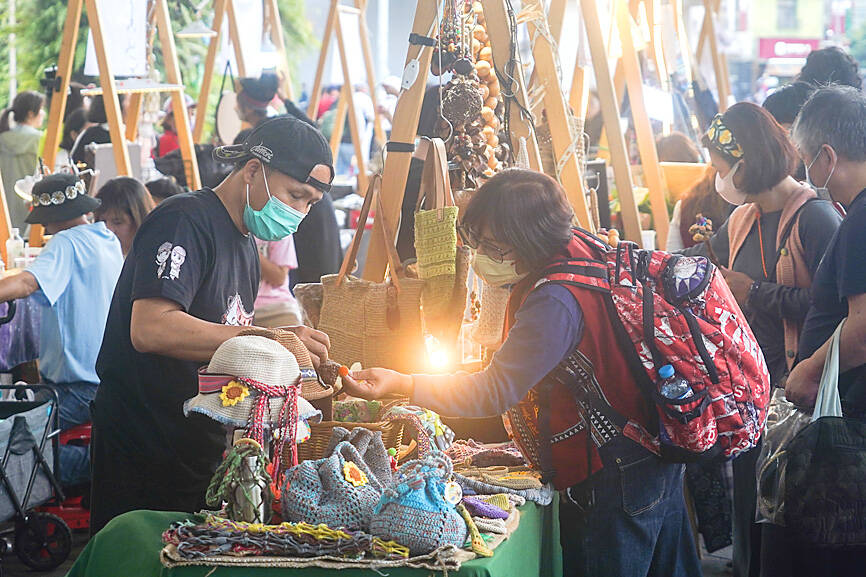Business confidence last month increased among manufacturers, service providers and construction firms, as non-tech product suppliers benefited from China’s post-pandemic opening while tech firms waited for a rebound, the Taiwan Institute of Economic Research (TIER, 台灣經濟研究院) said yesterday.
“Three consecutive months of upswings in sentiment signifies the worst is over and things would improve going forward,” TIER economist Gorden Sun (孫明德) said.
The sentiment gauge for the manufacturing industry picked up 3.12 points to 91.19, marking the fourth straight month of increases and suggesting that a recovery is around the corner, the Taipei-based think tank said, citing a monthly survey.

Photo: CNA
The ratio of firms that saw improved business last month gained 11.1 percentage points to 30.1 percent, while companies with business downturn fell 19.1 percentage points to 25.1 percent, it said.
Selling prices for steel, petrochemical and electrical products stabilized in the wake of China’s reopening, but demand for electronics and communication devices remained weak in the US and Europe, Sun said.
Electronics providers with a positive business outlook for the next six months dropped 1.2 percentage points to 33.9 percent, while firms with negative views gained 1.3 percentage points to 15.5 percent, it said.
Electronics vendors are heavyweights in Taiwan, as they supply 60 percent of the world’s chips.
Global semiconductor supply has gradually returned to healthy levels and demand for inventory replenishment should begin in the second half of this year, Sun said.
Taiwan’s semiconductor firms are international leaders and would continue to meet the needs of global clients, the economist said.
Manufacturers of non-tech products are more optimistic, with about 60 percent of chemical product suppliers expecting business improvement, it added.
The confidence reading for service providers added 3.21 points to 94.97, growing for two months in a row, it said.
Daily stock turnover regained some muscle, favorable for brokerage commissions and interest on income, it said.
However, business at retailers, hotels and restaurants cooled slightly after the holiday effect faded, it said.
The confidence measure rose 1.2 points to 93.31 for construction firms and property brokers, due to the government’s highway improvement projects, construction on technology parks and carbon emission-reducing projects by state-run enterprises, TIER said.
Property transactions are taking a hit from unfavorable policy and monetary tightening, it said, adding that buying interest is likely to stay weak after the central bank on Thursday raised interest rates for the fifth time and economic uncertainty lingers.

UNCERTAINTY: Innolux activated a stringent supply chain management mechanism, as it did during the COVID-19 pandemic, to ensure optimal inventory levels for customers Flat-panel display makers AUO Corp (友達) and Innolux Corp (群創) yesterday said that about 12 to 20 percent of their display business is at risk of potential US tariffs and that they would relocate production or shipment destinations to mitigate the levies’ effects. US tariffs would have a direct impact of US$200 million on AUO’s revenue, company chairman Paul Peng (彭雙浪) told reporters on the sidelines of the Touch Taiwan trade show in Taipei yesterday. That would make up about 12 percent of the company’s overall revenue. To cope with the tariff uncertainty, AUO plans to allocate its production to manufacturing facilities in

TAKING STOCK: A Taiwanese cookware firm in Vietnam urged customers to assess inventory or place orders early so shipments can reach the US while tariffs are paused Taiwanese businesses in Vietnam are exploring alternatives after the White House imposed a 46 percent import duty on Vietnamese goods, following US President Donald Trump’s announcement of “reciprocal” tariffs on the US’ trading partners. Lo Shih-liang (羅世良), chairman of Brico Industry Co (裕茂工業), a Taiwanese company that manufactures cast iron cookware and stove components in Vietnam, said that more than 40 percent of his business was tied to the US market, describing the constant US policy shifts as an emotional roller coaster. “I work during the day and stay up all night watching the news. I’ve been following US news until 3am

Taiwan will prioritize the development of silicon photonics by taking advantage of its strength in the semiconductor industry to build another shield to protect the local economy, National Development Council (NDC) Minister Paul Liu (劉鏡清) said yesterday. Speaking at a meeting of the legislature’s Economics Committee, Liu said Taiwan already has the artificial intelligence (AI) industry as a shield, after the semiconductor industry, to safeguard the country, and is looking at new unique fields to build more economic shields. While Taiwan will further strengthen its existing shields, over the longer term, the country is determined to focus on such potential segments as

COLLABORATION: Given Taiwan’s key position in global supply chains, the US firm is discussing strategies with local partners and clients to deal with global uncertainties Advanced Micro Devices Inc (AMD) yesterday said it is meeting with local ecosystem partners, including Taiwan Semiconductor Manufacturing Co (TSMC, 台積電), to discuss strategies, including long-term manufacturing, to navigate uncertainties such as US tariffs, as Taiwan occupies an important position in global supply chains. AMD chief executive officer Lisa Su (蘇姿丰) told reporters that Taiwan is an important part of the chip designer’s ecosystem and she is discussing with partners and customers in Taiwan to forge strong collaborations on different areas during this critical period. AMD has just become the first artificial-intelligence (AI) server chip customer of TSMC to utilize its advanced